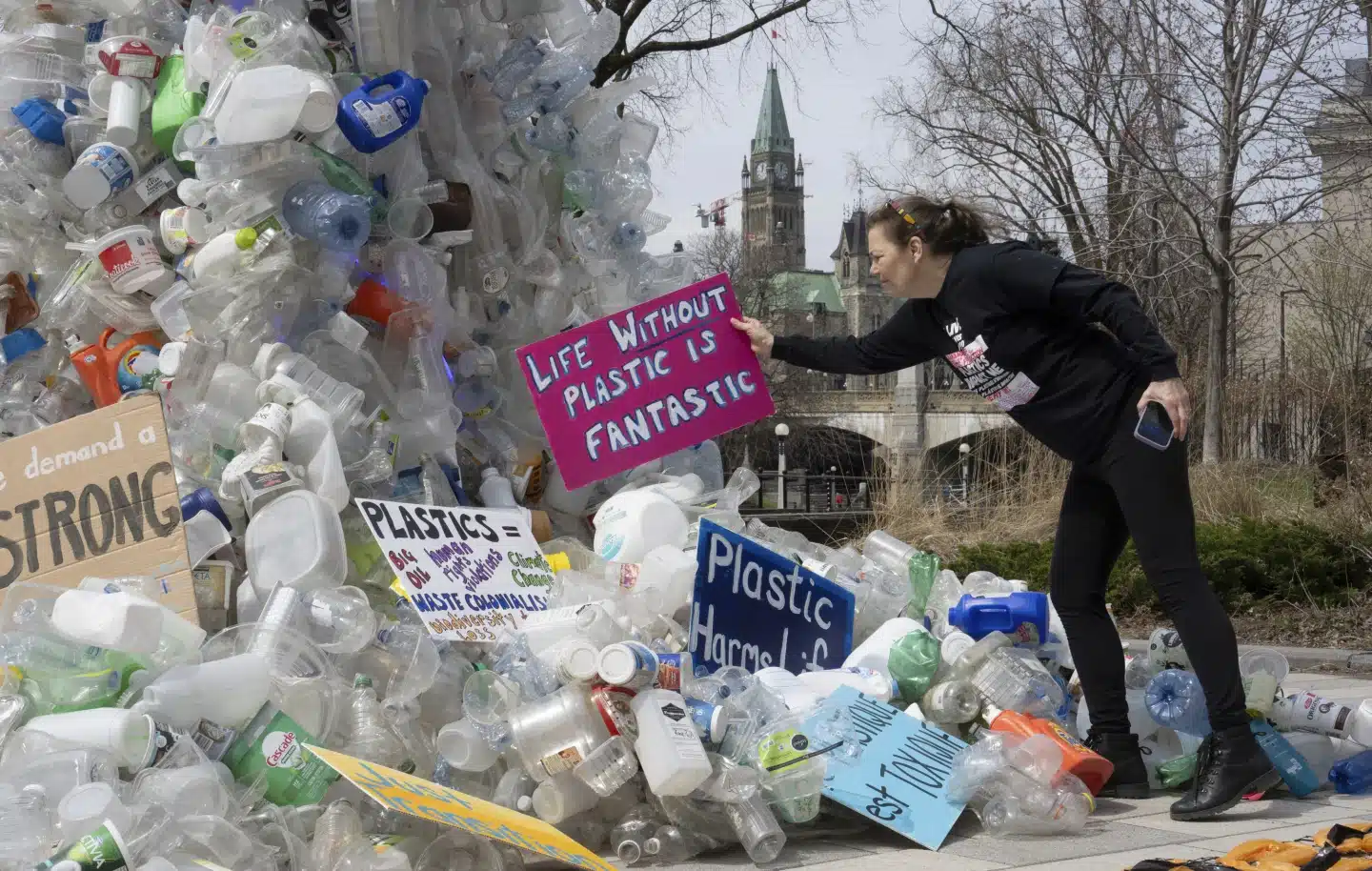Ontario, Canada. Negotiators from most states are currently discussing the draft of a worldwide treaty aimed at eradicating plastic pollution, marking the first instance of such negotiations.
Delegates and observers at the Intergovernmental Negotiating Committee on Plastic Pollution regarded it as a positive development, and discussions have transitioned from conceptualization to the formulation of a treaty at this fourth out of five planned plastics summits.
The concept of internationally restricting the production of plastic is highly controversial. The document continues to exist despite the vehement opposition from countries and companies involved in plastic production, as well as oil and gas exporters. The majority of plastic is derived from fossil fuels and chemical compounds.
The Ottawa session was set for late Monday or early Tuesday. During Monday night’s meeting, there was a heated debate about whether the working groups should prioritize the issue of plastic manufacture before the upcoming and final meeting.
Global Negotiations On A Treaty To End Plastic Pollution At Critical Phase In Canada
According to Stewart Harris, a representative of the International Council of Chemical Associations, the members are advocating for a treaty that specifically addresses the recycling and reuse of plastic, sometimes known as “circularity.”
Many scientists from the Scientists’ Coalition for an Effective Plastics Treaty attended the meeting to present scientific facts on plastic pollution to negotiators. Their objective was to counteract any misinformation that may be circulating.
Bethanie Carney Almroth, an ecotoxicology professor at Sweden’s University of Gothenburg and coalition co-leader, stated that yesterday’s claim about the lack of microplastic data is factually incorrect. In reality, there have been 21,000 published articles on micro and nanoplastics. “It resembles the game Whac-A-Mole.”
Global Negotiations On A Treaty To End Plastic Pollution At Critical Phase In Canada
According to her, scientists have been subjected to harassment and intimidation by lobbyists. She informed the United Nations that a lobbyist shouted directly at her during a meeting.
Ecuador’s lead negotiator, Walter Schuldt, stated that despite their divergences, the countries represented have a shared objective of advancing in the treaty process.
“In the interview, he emphasized that we are discussing the preservation of life in the future, encompassing not only human life but also all forms of life on Earth,” he stated.
He expressed his pride in participating in and contributing his small but meaningful effort to the worldwide initiative to tackle an environmental issue.
The negotiators’ objective is to finalize a treaty by the conclusion 2024. The topics given to expert working groups by tonight will progress to the final stage of discussions in autumn in South Korea.
Without undertaking this preparatory work in between meetings, it would be intimidating to successfully conclude the negotiations within this year. Several nations expressed their dedication to collaborating during the intervals between talks on Sunday evening.
The treaty negotiations commenced in Uruguay in December 2022, and Rwanda and Peru’s subsequent submission of the resolution initiated the process in March 2022.
Progress was sluggish at the Paris discussions in May 2023 and the Nairobi talks in November as countries deliberated about the process’s regulations.
Upon the arrival of numerous negotiators and observers in Ottawa, Luis Vayas Valdivieso, the committee chair from Ecuador, reminded them of their objective and urged them to exhibit ambition.
“We have a responsibility to create a new treaty that will stimulate and direct the necessary actions and global collaboration to achieve a future devoid of plastic pollution,” he stated. “We must not disappoint them.”
The delegates have discussed the treaty’s scope, chemicals of concern, problematic and avoidable plastics, product design, and financing and implementation.
Delegates also simplified the cumbersome assortment of choices from the previous meeting.
Many individuals journeyed to Ottawa from communities impacted by plastic manufacture and pollution. Residents residing near petrochemical plants and refineries in Louisiana and Texas distributed postcards to the U.S. State Department with the message, “We desire your presence.”
Global Negotiations On A Treaty To End Plastic Pollution At Critical Phase In Canada
The members of the Break Free From Plastic movement journeyed collectively and urged negotiators to personally witness air and water contamination in their regions.
“This remains the most optimal choice we possess to witness transformation in our communities.” Corporations heavily influence them. Jo Banner, a St. John the Baptist Parish resident in Louisiana, expressed their inability to attend the local government. “It seems that this is my sole opportunity and source of optimism to assist my community in recovering and finding solace.”
Members of an Indigenous Peoples’ Caucus held a news conference on Saturday. They expressed concern that microplastics are polluting their food supply. They emphasized that this pollution threatens their communities and ways of life, which are guaranteed to them indefinitely. They perceived a lack of acknowledgment of their opinions.
“Our stakes are larger.” “These are our hereditary territories that are being contaminated with plastic,” Juressa Lee, a resident of New Zealand, expressed following the occurrence. “We are individuals or groups who possess legal rights, rather than individuals or groups with an interest or involvement in a particular issue.” We should be granted greater autonomy in expressing our opinions and judgments than individuals responsible for the issue.
Historically, plastic was not present, but currently, in the Bay of Plenty, the sediment and shellfish, which serve as their seafood supply, are contaminated with little plastic particles. Lee stated that they consider nature’s “resources” as valuable assets.
“Indigenous methods can serve as a guiding force,” Lee stated. “The current approach we are taking is evidently ineffective.”
Vi Waghiyi journeyed from Alaska to advocate for the rights and interests of Arctic Indigenous communities. She emphasizes to decision-makers the need to ensure that this pact provides long-term protection against plastic pollution for future generations.
She stated that their purpose in being here is to serve as the moral compass, ensuring that the decisions made are in the best interest of all individuals.
SOURCE – (AP)









